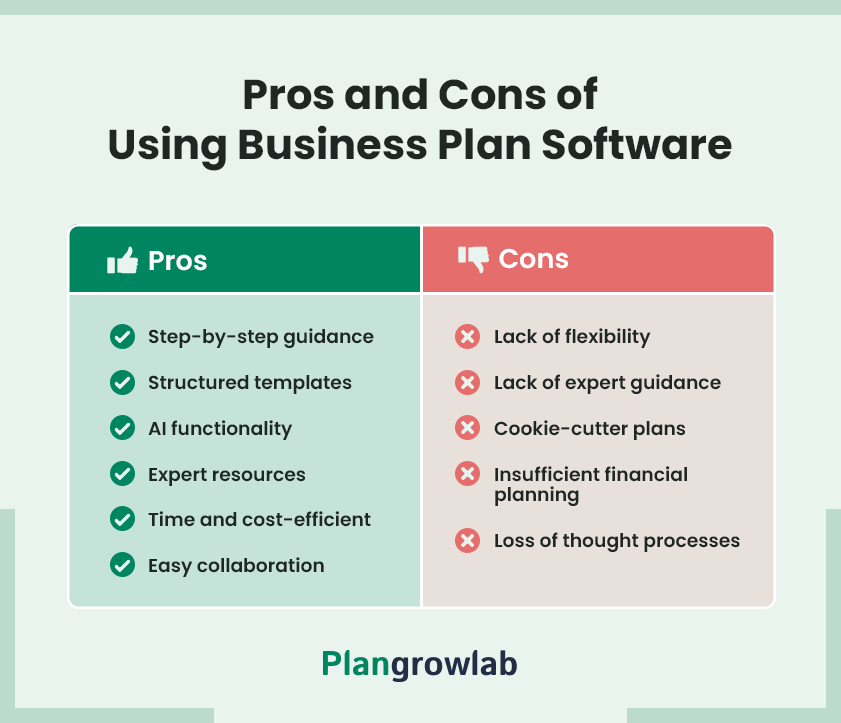You’re here because you’re contemplating: Are business plan software reliable enough to prepare your business plan?
Well, there’s no argument that this software has revolutionized the way entrepreneurs approach business planning. Thanks to their streamlined planning approach and AI, people no longer consider planning as an overwhelming task.
However, is it a tool you require for your business plan? We would say, know the pros and cons of using a business plan software and only then commit to any subscription or paid plans.
But before that…
What is business plan software?
Business plan software is a digital tool that assists entrepreneurs, students, and startups in creating, structuring, and reviewing their business plans. Such software often provides business plan templates, AI-powered functionalities, canvases for strategic planning, and pitch deck templates.
However, it’s important to review each software thoroughly before signing up for their subscription.
Pros and cons of using business plan software

Writing a business plan can be intimidating. Business plan software tries to ease this intimidation by offering templates, a guided workflow, and some advanced forecasting and AI functionalities.
While its ability to create fully customizable plans is questionable, it sure has a few benefits you should know of.
Pros of using a business plan software
A few benefits of using a business plan include:
1. Step-by-step guidance
Most entrepreneurs struggle to get through a blank-page syndrome. They feel lost and may ditch the idea of writing a business plan altogether.
Business plan software helps get over this with its thoroughly outlined business plan templates. These are like fill-in-the-blank templates that guide the users through each section of a business plan.
From executive summary to market analysis, competitor analysis, and financial plan—these templates have a very precise outline of what each section should include. Paired with relevant samples, tips, and examples, users get enhanced clarity and direction to completing their business plans.
2. Structured templates
Placing together a business plan is as much of a task as writing one. And a business plan software helps with both.
These software often have a variety of templates to present different types of business plans. This includes templates for:
- Investor plans
- Internal-use plans
- Financial plans
- One-page plans
- Strategic plans
- Standard business plan
They also offer cover page templates and editing features to place together a professional business plan.
So you get directions not only to write your plans but to make them seem professional as well.
3. AI to ease the process
Many business plan software offers AI functionality to write, edit, or design your plans. With AI it's much possible to pull together the first draft of your business plan in about a few minutes. This is especially true if yours is a simpler business model.
Now, you may avoid using AI to generate suggestions or ideas for your business plan. However, you can use it for writing clear and compelling business plan content. Additionally, you can use AI to generate forecasts, visuals, and reports for your financial and market analysis sections.
4. Expert resources
Business plan software offers an extensive collection of resources to help an individual understand the business planning process.
This includes video tutorials, industry-specific examples and market reports, financial calculators, strategic canvases, and business model templates.
These resources can be quite handy for individuals who are still testing the waters of entrepreneurship with their new venture.
5. Time- and cost-efficient
The time and cost efficiency of business plan software makes them particularly fit for entrepreneurs who can’t spend time or money on their business plans. A business plan software with automation, AI features, and guided templates helps complete a business plan in less than a week.
Anyone who needs a quick idea validation or has an urgent investor meeting can benefit from such software.
6. Easy collaboration
Business plan software allows you to collaborate with leaders and key managers to prepare a truly insightful business plan.
The real-time collaboration features of these tools help you gather inputs from specialized individuals in different stages of the planning process. This way you don’t end up creating an unrealistic or self-centered plan.
That’s one side of business plan software. However, like everything else, even these software have a flip side. Let’s check them out.
Cons of using business plan software
Here are a few cons associated with business plan software, especially the bad ones:
1. Lack of flexibility
Most business plan software restricts the user’s ability to customize their plan completely. The limited editing features force the entrepreneurs to accept the low-quality plan or move ahead with no plan at all.
Businesses require their business plans to look unique. They might need multiple modifications in their plan to test different strategies and theories.
However, restricting features of a business plan software limits the infinite possibilities of customizing a business plan.
2. Generates cookie-cutter plans
No two business plans are the same, not even for the businesses operating within the same niche. Sadly, most business plan software that claims to produce unique business plans ends up generating cookie-cutter plans without any edge.
They look the same and fail to acknowledge the industry benchmark established for your business. Their suggestions for strategies and finances are generic and unimpressive.
Remember, good-looking business plans aren’t enough. If your plan isn’t contextual, your readers will quickly smell fluff. Moreover, the cookie-cutter plan fails to motivate your internal team and confuses them further instead of offering them a roadmap.
3. Lack expert guidance
A business plan software offers resources, guides, and templates to prepare a realistic business plan. However, it’s not enough. To write a realistic plan, an entrepreneur needs answers to a couple of important questions. Questions such as:
- What is their target market?
- What is their achievable market size or serviceable obtainable market (SOM)?
- What should be their competitive advantage?
- Should they open a remote or a physical location?
- What should be their sales channel?
- How much money should they raise?
- What equity should they be offering?
- What would be the cash situation at different points in time?
The list continues.
Most business plan software on the market can offer these answers based on no concrete data. Just guesswork. They fail to factor in real-market data and the opinions of experts who understand the industry in a better way.
Relying solely on the software may result in a business plan that’s incapable of driving your business toward success.
4. Insufficient financial planning
A couple of spreadsheets and a financial calculator don’t make you financially prepared for your business. Entrepreneurs need to understand their future financial standing, liquidity, cash position, capital requirements, profitability, and risk-taking appetite to build a concrete foundation.
Well, most business plan software on the market fails to ease the financial planning process. They mislead the entrepreneurs into creating unrealistic financial plans upon which many of their business strategies would rely.
Instead of relying on business plan software, business plan consultants and financial experts can be more helpful.
5. Loss of thought processes
Marc Andreessen, the general partner at Andreessen Horowitz once said, “The process of planning is very valuable for forcing you to think hard about what you’re doing, but the actual plan that results from it is probably useless.”
Well, it’s true. It’s the planning process that’s more important than the plan as it prepares you to face business adversities.
So while the idea of getting your business plan ready in 10 minutes might sound tempting, it won’t benefit your thought processes. The resulting plan from a 10-minute business plan software would miss the edge that makes business plans practical.
With that said…
Is a business plan software right for you?
The growth of business plan software has indeed made business planning easier. Entrepreneurs don’t need a fancy budget anymore to get their business plans ready.
However is business plan software right for you?
Let’s understand:
Who should use business plan software?
A business plans software is suitable for:
- Someone who wants to validate their business idea.
- Individuals who want to get their business plan ready on a tight schedule.
- People with limited budgets who can’t afford a professional consultant.
- Individuals with a fair grip over business planning concepts.
- Someone who can work their way around software without requiring extra guidance.
- Entrepreneurs who have a simpler business idea.
Who should avoid business plan software?
A business plan software isn’t a good choice for:
- Entrepreneurs with a complex business model.
- Individuals with a risky and extremely competitive business idea.
- Entrepreneurs planning to seek a huge funding amount.
- Businesses that require a highly personalized plan and input from professional consultants.
- Entrepreneurs who can afford the services of business plan consultants.
Conclusion
Given the negative aspects of business plan software, should you avoid them altogether?
Not really. Business planning software makes business planning accessible to all. It’s a useful tool, however, just not a tool suitable for everyone.
That said, if yours is a business that can benefit from the expertise, understanding, and insights of a business plan consultant, Plangrowlab is the solution for you.
With an experience of 10+ years, our writers at Plangrowlab have a track record of developing winning business plans and pitch decks for the most diverse entrepreneurs. We help with end-to-end planning processes transforming your business ideas into successful business plans.
Frequently Asked Questions
Can I get funding with a business plan made by software?
Yes, you can secure the funding using business plans made through software. However, this is only true if you end up creating a highly personalized plan. The surface-level plans with a lack of contextual depth tend to surface out. Investors won’t spend a minute entertaining such plans.
What’s the average cost of business plan software?
Leading business plan software in the market costs anywhere between $10-$200 for a monthly subscription or a one-time fee. Anything more than that is usually not worth it unless they’re offering something better than the leading software.
How long does it take to learn business plan software?
Most business plan software has a smooth learning curve. However, you may take a couple of days to acquaint yourself with the features and offerings of these tools completely. A well-developed software with a great user interface and navigation can get the users started just instantly.
Can business plan software be used for any type of business?
Yes. Many business plan software in the market are suited for all sorts of businesses. However, businesses with complex business models may benefit more from the services of business plan consultants.

